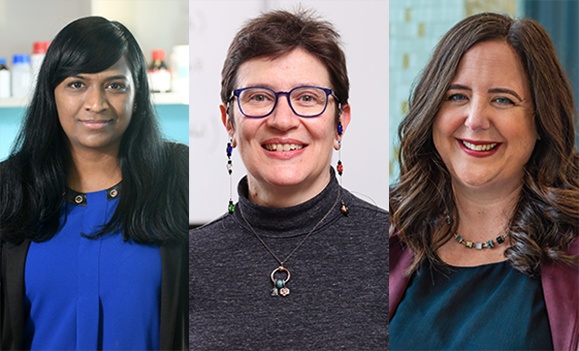International Women‚Äôs Day is a moment to celebrate the achievement of women, but also an opportunity for organizations to look at how they support and elevate the careers of women. While improvements have been made in the proportion of women in Canadian academia ‚ÄďŐż Statistics Canada reported that 49 per cent of tenure-track positions were held by women in 2019, up from 33 per cent in 1990 ‚Äď inequities remain.Őż
There are still wide disparities in gender representation in many fields of study, and women’s time to tenure continues to be impacted by parental leave. In 2019, less than two-thirds of full-time female faculty held tenured positions, compared with three-quarters of their male counterparts, with male faculty also more likely to be full professors.
 ‚ÄúWe are making progress, but we certainly aren‚Äôt there yet,‚ÄĚ says Dr. Alice Aiken, Ľ∆…ę÷Ī≤•‚Äôs vice president research and innovation and co-chair of Ľ∆…ę÷Ī≤•‚Äôs Women in Research Caucus (WiRC). ‚ÄúIn 2023, we refreshed our strategic research direction based on feedback received from our research community. A key outcome of that process identified the need to embed inclusive research excellence in everything we do. We need to think about what this means for the women in our research community and how we continue to support their success at the university.‚ÄĚ
‚ÄúWe are making progress, but we certainly aren‚Äôt there yet,‚ÄĚ says Dr. Alice Aiken, Ľ∆…ę÷Ī≤•‚Äôs vice president research and innovation and co-chair of Ľ∆…ę÷Ī≤•‚Äôs Women in Research Caucus (WiRC). ‚ÄúIn 2023, we refreshed our strategic research direction based on feedback received from our research community. A key outcome of that process identified the need to embed inclusive research excellence in everything we do. We need to think about what this means for the women in our research community and how we continue to support their success at the university.‚ÄĚ
To explore this, we invited three members of WiRC to share their experiences rising to leadership roles, the importance of mentorship from other women, and how academia benefits from greater female representation. Dr. Mita Dasog is an associate professor in the department of chemistry and Izaak Walton Killam Memorial Research Chair. Dr. Christine Chambers is co-chair of WiRC and a Tier 1 Canada Research Chair in Children‚Äôs Pain jointly appointed to the departments of psychology and neuroscience and pediatrics. Dr. Nur Zincir-Heywood is a Distinguished Research Professor and associate dean research at the Faculty of Computer Science.Őż
What role has the support of other women played in your career success?
Dr. Dasog: I have been fortunate to have women who have championed me, introduced me to other researchers and collaborators to expand my professional network and have provided me emotional and moral support to overcome challenging situations. Having that visibility and support has played a big role in boosting my self-confidence and my success.Őż Őż
Dr. Chambers: While I‚Äôm grateful for the many fantastic male colleagues and allies in my life, women have played an invaluable role in my career success.Őż Women supporting women creates a sense of belonging in male-dominated fields, fostering an environment where women can thrive and excel. Support from other women continues to boost my confidence and opens doors to opportunities, collaborations, and networks that have been pivotal. Despite the optics of success, the last year has been a particularly challenging one for me professionally. I am so grateful for the women who have held space with me during this time, stood by me while I felt like crumbling with: ‚ÄúI see you. I believe in you. I care about you. I will help you. Keep going‚ÄĚ.
Dr. Zincir-Heywood: The role of the support of other women played in the success throughout my career is tremendous. Most importantly, they make me feel valued, respected, and heard. They inspire and empower me to confront obstacles, pursue my goals, and turn my research into real-life strategies. At times I question myself, and what I do, they make me understand ‚ÄúI belong‚ÄĚ.
Why do you think it’s so important for women in academia to mentor each other?
Dr. Chambers: Women in academia face unique challenges and barriers that are best understood and navigated by other women who have faced them first-hand.Őż While I‚Äôve always surrounded myself with incredible women, over the course of my 30-year career, I have never actually had a female supervisor or boss, I‚Äôve always directly reported to men ‚Äď male thesis supervisors, male department heads, male deans, etc. Mentorship among women provides a safe space for sharing experiences, challenges, and strategies for overcoming obstacles. It allows for the transmission of knowledge, skills, and wisdom accumulated through lived experiences, which can be immensely empowering for mentees. Additionally, seeing other women succeed and thrive in academia serves as powerful inspiration and motivation for younger generations, fostering a supportive cycle of mentorship and empowerment.
Dr. Zincir-Heywood: I think mentorship plays a very important role for women in academia. Even though there has been a significant increase in the number of female students in our universities, there is still a gender gap in academia. This is usually attributed to several factors such as stereotypes, biases and systemic barriers that have historically discouraged or limited the participation of women in academia. These obstacles have also contributed to a scarcity of role models and a lack of female representation at senior levels. Thus, it is very important for women in academia to mentor each other in terms of offering insights for career development, providing guidance on overcoming obstacles, and sharing strategies for achieving success in new initiatives.
Dr. Dasog: Academia, like many fields, has historically been male dominated, especially in certain disciplines. When women mentor each other, they can provide tailored advice and strategies to navigate and overcome systemic barriers, including gender bias and discrimination. Mentorship among women fosters a sense of community and belonging, which can be particularly valuable in environments where women might feel isolated or marginalized. More importantly, by supporting each other, we can challenge and gradually change the culture of the institutions to be more inclusive and equitable, making academia a more welcoming place for future generations of women.
How does academia benefit from a greater proportion of women?
Dr. Zincir-Heywood: Academia benefits from a greater proportion of women to achieve a vibrant and successful higher education eco-system with full human potential, creativity, and innovation. Research shows that more women leaders in academia enables leveraging talent, enhancing innovation and collective intelligence, strengthening organizational climate, increasing social responsibility and reputation as well as improving financial performance.
Dr. Dasog: Studies have suggested that women often employ collaborative and inclusive leadership styles that can enhance teamwork and create more supportive academic environments. This can improve the quality of research and education by fostering a culture of openness and mutual respect. Women in academia often expand research agendas to include topics and methodologies that have historically been underexplored. This can lead to new insights and breakthroughs in various fields. To be globally competitive, institutions must attract and retain talent from the entire population, not just a fraction of it. Utilizing the potential of our full community ensures that the academic sector is vibrant, competitive, and truly innovative.
Dr. Chambers: Academia benefits greatly from a greater proportion of women and other diverse groups for several reasons. Diversity fosters innovation and creativity by bringing together different perspectives, experiences, and approaches to problem-solving. Women and members of diverse groups of academics bring unique insights and contributions to research, teaching, and leadership roles that enrich the academic landscape. Increasing the representation of women and others in academia as well as empowering them in their roles helps to address gender bias, racism, and promotes equity, creating a more inclusive and supportive environment in academia. I didn‚Äôt really have very many role models through my training of women with children in academia. I‚Äôm the mother of four children and I‚Äôve had to pretty much figure it out on my own. More women in academia means more examples of how different women can navigate their careers and balance their personal and professional lives.Őż Őż
What do you believe is needed to encourage more women to pursue careers in your academic discipline and for supporting their progression and success within it?
Dr. Dasog: Institutional, cultural, and policy changes that address systemic barriers to women's participation and advancement in academia are necessary to encourage more women to pursue this career. Too much attention is paid to recruitment efforts and not enough is done to support women once they are part of academia. Institutions need to be more transparent in their operations and how decisions are made. Leaders need to truly embrace EDIA principles beyond receiving the training and ask themselves if they are perpetuating any bias in the decision they make or in their behavior. We need to value women‚Äôs contributions and credit and reward their work and minimize the extra unpaid labor that is often expected of them. The list is long, but we can start here.Őż Őż
Dr. Chambers: Implementing policies and practices in academia that promote gender equity and inclusion is essential. We must actively work to dismantle systemic barriers and biases that hinder women's advancement in academia, such as unequal opportunities for funding, promotion, and recognition. I once remarked to a female mentor at Dal how disappointed I was that so few women were winning prestigious awards ‚Äď she quickly replied with ‚ÄúWell you can change that, nominate them!‚ÄĚ Since that time, I‚Äôve made a concerted effort to nominate as many amazing women I know for any awards they are eligible for (I aim for one a month!). It‚Äôs also why I‚Äôve been so committed to the Women in Research Caucus at Ľ∆…ę÷Ī≤• ‚Äď which offers guidance, support, and networking opportunities. I also think it's important to be engaged publicly and in the media. Promoting visibility and celebrating the achievements of women can inspire future generations of women and break down stereotypes about who can succeed in academia. It‚Äôs on all of us to foster an institutional culture of support and collaboration, where women are valued and respected for their contributions.
Dr. Zincir-Heywood: For my academic discipline, Computer Science, there exists a big gender gap in academia. To be able to address this, we need more investment to create positions to attract and retain women faculty. Also, we need to create equal opportunities, equal pay, representation, and recognition to build inclusive work environments where the women in academia can be supported and grow.ŐżŐż
International Women's Day 2024
Őż
- Jody Couch, Dal's chief information officer and assistant vice-president of Information Technology Services, was encouraged by others when first starting out in tech. Now, sheŐżstrives to pay it back.
- This Saturday, Dal faculty members are among a group ofŐżaccomplished writers coming togetherŐżfor a free, off-campus reading event in honour of International Women's Day.
- Cynthia Pilichos, co-lead on the Ľ∆…ę÷Ī≤• Alumni Association,ŐżŐż‚ÄĒ the oldest alumni association at Dal ‚ÄĒ and the evolution of fundraising from the 1980s to now.Őż

